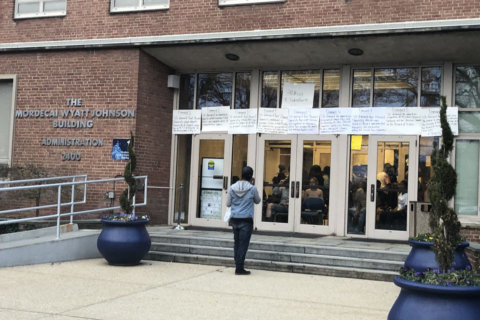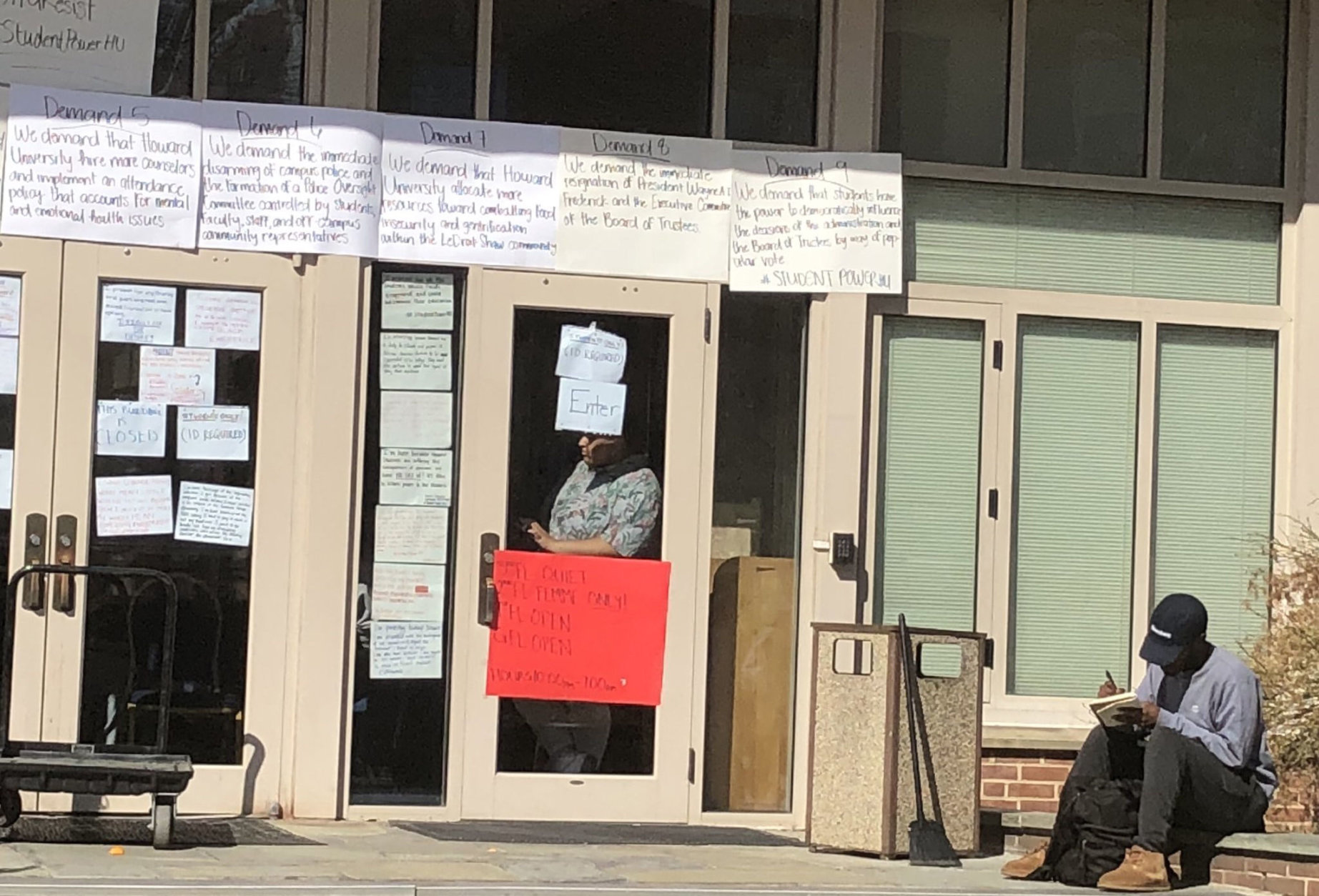
Some of Howard University’s Board of trustees just walked inside for scheduled 9a meeting with students @WTOP pic.twitter.com/qnxY4DtdBL
— Melissa Howell (@Mhowell003) March 31, 2018
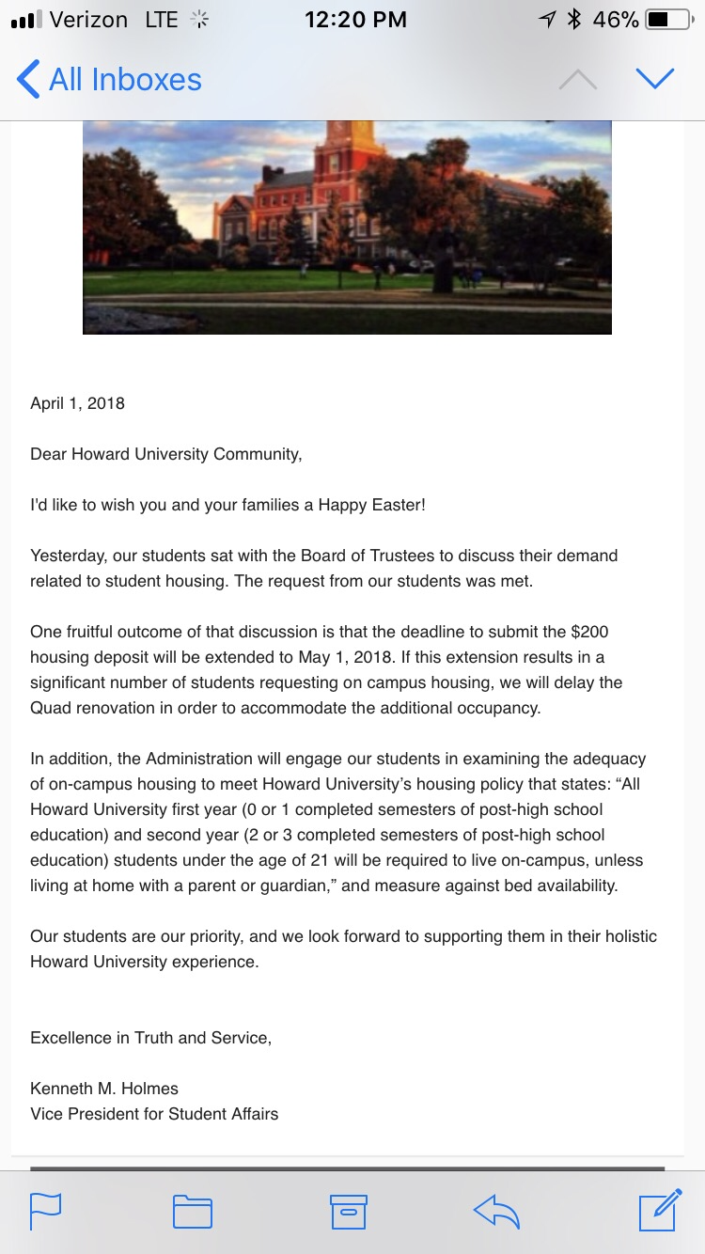
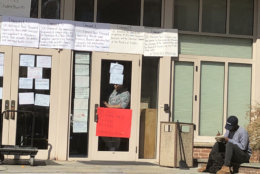

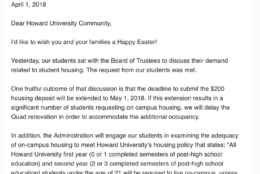
WASHINGTON — The fourth day of the sit-in by student protesters at Howard University is coming to an end, but organizers say protests will continue on Monday.
In spite of meetings earlier Sunday with the Board of Trustees, students are not moving out of the school’s Mordecai Wyatt Johnson Administration Building even as classes are set to resume on Monday.
On Sunday, the board met one of their demands: extending the deadline to submit a $200 housing deposit until May 1.
They met again Sunday night.
An email was sent to the Howard University Community, signed by Vice President of Student Affairs Kenneth M. Holmes, stating, “One fruitful outcome of [the talk] is that the deadline to submit the $200 housing deposit will be extended to May 1, 2018. If this extension results in a significant number of students requesting on-campus housing, we will delay the Quad renovation in order to accommodate the additional occupancy.”
The email also says Howard’s administration will look into a housing policy that states that all freshmen and sophomores (any student with zero to three completed semesters) under 21 must live on campus or live at home with a parent or guardian. They will measure the policy against bed availability.
Students are not yet satisfied with the school’s interest in making the changes organizers are asking for.
Alexis McKenney of the student group HU Resist spoke Sunday afternoon.
She said students are looking for the school’s administration to take their concerns more seriously, including the way it handles allegations of sexual misconduct on campus.
Along with other things, the students are demanding the resignation of president Wayne A.I. Frederick, who has yet to meet with the students.
“I am extremely disappointed in his inaction and his lack of communication considering the very serious condition of this university right now,” McKenney said. “Him not saying anything or making the effort to reach out to us makes a very strong statement.”
Other demands include adequate student housing for students under 21; an end to “unsubstantiated” tuition hikes; disarming campus police officers; efforts to prevent sexual assault; and the resignations of both Frederick and the board of trustees’ executive committee.
“There’s still some work to be done,” said McKenney, a senior Political Science major. “Of course, it’s gotten to a point where we have to take over a building, so obviously there’s some tension still, but we’re working through it.”
“Collectively, the board of trustees was extremely impressed with the way that the students have handled the negotiations,” alumni trustee Rock Newman told reporters outside the building on Saturday. “They have been productive, and we’re hopeful that they can continue that way.”
In a stark contrast from Friday, when only two trustees met with protesters, eight trustees met with the students on Saturday and more met again with them on Sunday.
Sunday afternoon, McKenney was asked about students leaving the sit-in to attend class or take exams.
“If people have exams they can leave as they please, but most of these students are committed to staying here and staying true to our purpose until negotiations are finished and our demands are met,” she said. “We want to make sure we are making progress, and we are taking it one demand at a time.”
The protest began Thursday, a day after Frederick’s admission that there had been a “misappropriation of funds” in the university’s financial aid department for about nine years.
Howard alumni, neighbors, American University students and activists from Black Lives Matter D.C. are among those lending their support. One supporter in particular, Ben’s Chili Bowl, cooked up over 200 chili dogs for the student protesters.
Some Ben’s employees are students at Howard, explained a spokesperson, who added that the restaurant has a tradition of donating food to those who stand for a cause or who are in need.
The protest continues as the 50th anniversary of Martin Luther King Jr.’s assassination approaches. The significance of a sit-in at a historically black university — occurring nearly 50 years after a black champion of nonviolent resistance was slain — isn’t lost on protesters.
“We do this knowing that we are not the first to do this,” McKenney said.
WTOP’s Keara Dowd, Zeke Hartner and Melissa Howell contributed to this report.


